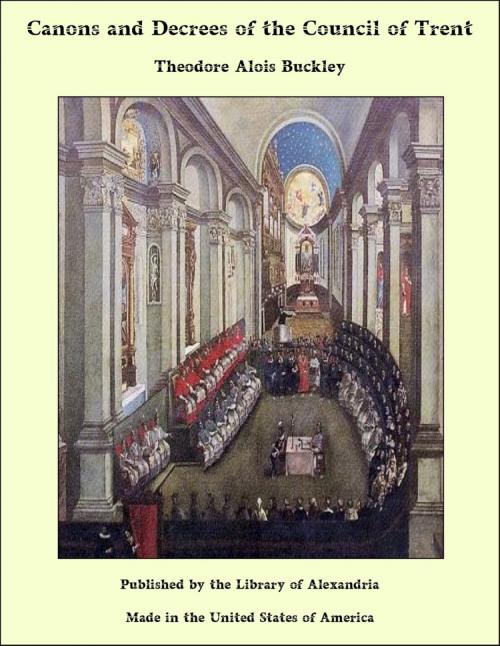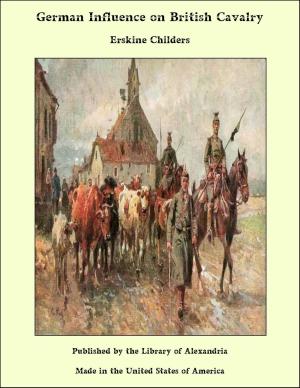Canons and Decrees of the Council of Trent
Nonfiction, Religion & Spirituality, New Age, History, Fiction & Literature| Author: | Theodore Alois Buckley | ISBN: | 9781465611420 |
| Publisher: | Library of Alexandria | Publication: | March 8, 2015 |
| Imprint: | Language: | English |
| Author: | Theodore Alois Buckley |
| ISBN: | 9781465611420 |
| Publisher: | Library of Alexandria |
| Publication: | March 8, 2015 |
| Imprint: | |
| Language: | English |
At the beginning of this our pontificate, which, not on account of our own merits, but, of its own great goodness, the providence of Almighty God hath committed unto us, already perceiving into what disturbances of the times, and unto how many embarrassments of almost all our affairs, our pastoral care and watchfulness were called; we desired, indeed, to remedy the evils of the Christian commonwealth, with which it had long been afflicted and well-nigh overwhelmed; but we also, as men compassed with infirmity, perceived that our strength was unequal to take upon us so great a burthen. For, whereas we saw that there was need of peace to deliver and preserve the commonwealth from the many impending dangers, we found all things replete with enmities and dissensions; above all, the princes, to whom well-nigh the whole direction of matters has been intrusted by God, at enmity with each other. Whereas we deemed it necessary that there should be one fold and one shepherd for the Lord's flock, in order to confirm the integrity of the Christian religion, and the hope of heavenly things within us; the unity of the Christian name was well-nigh rent and torn asunder by schisms, dissensions, heresies. Whereas we could have wished the commonwealth safe and defended from the arms and insidious attacks of the unfaithful, yet, through our transgressions and the guilt of us all,—the wrath of God, forsooth, hanging over our sins,—Rhodes had been lost; Hungary harassed; war both by land and sea had been intended and planned against Italy, Austria, and Illyria; whilst our impious and ruthless enemy, the Turk, was never at rest, and deemed our own mutual enmities and dissensions his fitting opportunity for carrying out his designs with success. Wherefore, as we have said, having been called upon to guide and govern the bark of Peter, in so great a tempest, and in tho midst of so violently-upraised waves of heresies, dissensions, and wars, and, as we did not rely sufficiently on our own strength, we, first of all, cast our cares upon the Lord, that He might sustain us, and furnish our soul with firmness and strength, our mind with prudence and wisdom. Then, recalling to mind that our predecessors, endowed with admirable wisdom and holiness, had often, in the greatest perils of the Christian commonwealth, had recourse to œcumenical councils and general assemblies of bishops, as tho best and most opportune remedy, we also fixed our mind on holding a general council; and having consulted the opinions of those princes, whose consent seemed to us to be especially useful and opportune for this matter; when we found them, at that time, not averse from this so holy a work, we, as is attested by our letters and records, indicted an œcumenical council, and a general assembly of those bishops and other fathers whom it concerned, to be opened at the city of Mantua, on the tenth of the calends of June, in the year 1537 of the incarnation of our Lord, the third of our pontificate; having an almost certain hope that, when we were there assembled in the name of the liord, the Lord himself, as He promised, would be in the midst of us, and, in His goodness and mercy, easily put down, by the breath of His month, all the storms and all the dangers of the times.
At the beginning of this our pontificate, which, not on account of our own merits, but, of its own great goodness, the providence of Almighty God hath committed unto us, already perceiving into what disturbances of the times, and unto how many embarrassments of almost all our affairs, our pastoral care and watchfulness were called; we desired, indeed, to remedy the evils of the Christian commonwealth, with which it had long been afflicted and well-nigh overwhelmed; but we also, as men compassed with infirmity, perceived that our strength was unequal to take upon us so great a burthen. For, whereas we saw that there was need of peace to deliver and preserve the commonwealth from the many impending dangers, we found all things replete with enmities and dissensions; above all, the princes, to whom well-nigh the whole direction of matters has been intrusted by God, at enmity with each other. Whereas we deemed it necessary that there should be one fold and one shepherd for the Lord's flock, in order to confirm the integrity of the Christian religion, and the hope of heavenly things within us; the unity of the Christian name was well-nigh rent and torn asunder by schisms, dissensions, heresies. Whereas we could have wished the commonwealth safe and defended from the arms and insidious attacks of the unfaithful, yet, through our transgressions and the guilt of us all,—the wrath of God, forsooth, hanging over our sins,—Rhodes had been lost; Hungary harassed; war both by land and sea had been intended and planned against Italy, Austria, and Illyria; whilst our impious and ruthless enemy, the Turk, was never at rest, and deemed our own mutual enmities and dissensions his fitting opportunity for carrying out his designs with success. Wherefore, as we have said, having been called upon to guide and govern the bark of Peter, in so great a tempest, and in tho midst of so violently-upraised waves of heresies, dissensions, and wars, and, as we did not rely sufficiently on our own strength, we, first of all, cast our cares upon the Lord, that He might sustain us, and furnish our soul with firmness and strength, our mind with prudence and wisdom. Then, recalling to mind that our predecessors, endowed with admirable wisdom and holiness, had often, in the greatest perils of the Christian commonwealth, had recourse to œcumenical councils and general assemblies of bishops, as tho best and most opportune remedy, we also fixed our mind on holding a general council; and having consulted the opinions of those princes, whose consent seemed to us to be especially useful and opportune for this matter; when we found them, at that time, not averse from this so holy a work, we, as is attested by our letters and records, indicted an œcumenical council, and a general assembly of those bishops and other fathers whom it concerned, to be opened at the city of Mantua, on the tenth of the calends of June, in the year 1537 of the incarnation of our Lord, the third of our pontificate; having an almost certain hope that, when we were there assembled in the name of the liord, the Lord himself, as He promised, would be in the midst of us, and, in His goodness and mercy, easily put down, by the breath of His month, all the storms and all the dangers of the times.















